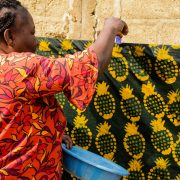The Ethical Fashion Brand That Seeks to Promote Authentic African Textiles

Toby Davies, Founder of NIMA wear looks to promote authentic African textiles straight from Ghana. The ethical fashion brand has committed itself to supporting local wholesalers and manufacturers in Accra. Toby identified that replica African shirts were being made, making it difficult for Africa to compete internationally. Due to this he decided to ensure that all materials used for NIMA were to be produced in Ghana. Read more as we interview Toby on his purpose and vision for NIMA wear.

What motivated you to create NIMA?
“The idea started thanks to my friend Harry – he’d been living in Uganda while building a school with the charity he’d set up, The Uganda School Project (TUSP). When he came back to the UK he gave me a shirt which had been made using some material he’d bought in a market and given to a local seamstress to cut and stitch. I loved the shirt and I loved the story behind it. The fact that this shirt was completely unique and had supported a local seamstress was really what got me thinking about this idea. I started researching African textiles and contacted Magie Relph, author of ‘African Wax Print: A Textile Journey’ and owner of The African Fabric Shop in Meltham, who was incredibly generous in sharing her time and knowledge with me.
She explained that the material Harry had bought in Uganda was not in fact African and more than likely imported from China. There is a big problem of Chinese imitations being imported to Africa, flooding the markets and being sold at a fraction of the price which has a negative impact on African textile manufacturing as they struggle to compete. So I wanted to make sure that all the textiles we used were authentically African to support the industry in any small way that I could while also providing opportunities for people to earn a fair wage for their work.”
What sets NIMA apart from other shirt brands?
“I think the fact that we make sure we can trace the origin of our textiles means that people can be sure that what they are wearing is quality, authentic and supports the textile manufacturing industry in Ghana as well as the people we work with throughout the supply chain. We buy the majority of our materials from market traders throughout the country while also working with wholesalers and independent batik makers to ensure that everything is made in Ghana, either by hand or machine. The people we work with are really at the heart of everything we do so people can be proud wearing their shirts knowing that it contributes to providing opportunities for people in Ghana and that they have been made with love and care.”

The shirts being sourced in Ghana has given tailors back home the opportunity to showcase their skills in the UK. Tell us more about the relationships you have built with your designer(s)?
“I met our chief tailor, Nurainy Inoussah, on the first day that I arrived in Ghana, long before I was ready to start looking for a tailor. I’d asked the hostel I was staying at, Agoo in Accra, if they could put me in touch with someone who would be able to guide me through the sprawling Makola Market to look at the fabric stalls. Nurainy arrived to pick me up, we jumped on his moped and he asked me what I was doing in Ghana, so I told him about the idea I had of working with tailors and seamstress to make clothes using locally sourced materials. He shouted back to me ‘I am a tailor!’. Nurainy is an incredibly skilled tailor but has also become a popular tour guide in recent years.
We became good friends and some of my favourite memories of Ghana are of riding around Accra together on his moped. I travelled around Ghana to explore the markets and see more of the country for the first couple of months but then returned to Accra to start working with Nurainy and his apprentice, Fataou Cisse, to make the first run of shirts. The work wasn’t always easy – we all became sick with malaria and some people who Nurainy wanted to share the work with let us down, but he and Fataou have done an amazing job and always with a smile on their faces as we listened to Reggae and Afrobeats in the workshop. They both live in Nima, a district in the capital of Accra, which is where the name of the brand comes from. It’s to pay tribute to them and all of the other amazing people in their community who helped us along the way.”

What can we expect from NIMA in the near future?
“The goal now is to get back to Ghana as soon as possible to use everything that we have learned from the first run to grow the business and streamline the manufacturing process while also providing more opportunities for people in Ghana to join us in the work. To begin with we have just focused on shirts but we want to grow our range to include Womenswear while also using all of the material that we’ve saved from the cutting room floor to make smaller pieces and minimize our waste.”
Check out NIMA on their Official Website and Instagram.

